According to a Gallup study, 45% of full-time employees in America are now working partly or fully remotely, and 91% of these people support their ability to work in this way.
Most Americans feel the home working revolution to date has been a success. PwC’s Remote Work Survey found that 83% of workers believe their company’s shift to remote working has been a positive thing. Evidence shows that it’s here to stay too. Upwork’s Future Workforce Report estimates that 40.7 million will be working fully remote in the next five years. Despite the support, not everyone can work remotely, and not everyone supports the philosophy.
What We Did
To better understand how the public feels about working from home in 2023, Resume.io has analyzed Twitter data in the UK and US to see where workers are most supportive and critical of remote work.
We analyzed more than 600,000 geotagged Twitter posts and used a sentiment-tracking AI called HuggingFace to determine whether posts about remote work were positive or negative. Want to find out where your city or state ranks? Read on.
Key Findings
- Residents of Delaware are most enthusiastic about remote work, with 46% of tweets supporting the policy.
- El Paso, TX, is America’s most positive city about WFH - 45.4% of posts are happy with the idea of remote work.
- There is considerable negative sentiment against remote work in Baltimore, MD, where 26% of tweets were critical of it.
- In the UK, residents of Watford and Brent - both located north of London, were most supportive of remote work - 58.3% and 54.9% of tweets in the areas respectively contained positive sentiment.
Residents of Delaware Are Happiest About Remote Working
Working from home has become more popular all across the US, but how do Americans really feel about it? Our research found that Delaware is the most optimistic state about remote working, with 46% of tweets about it containing positive sentiment.
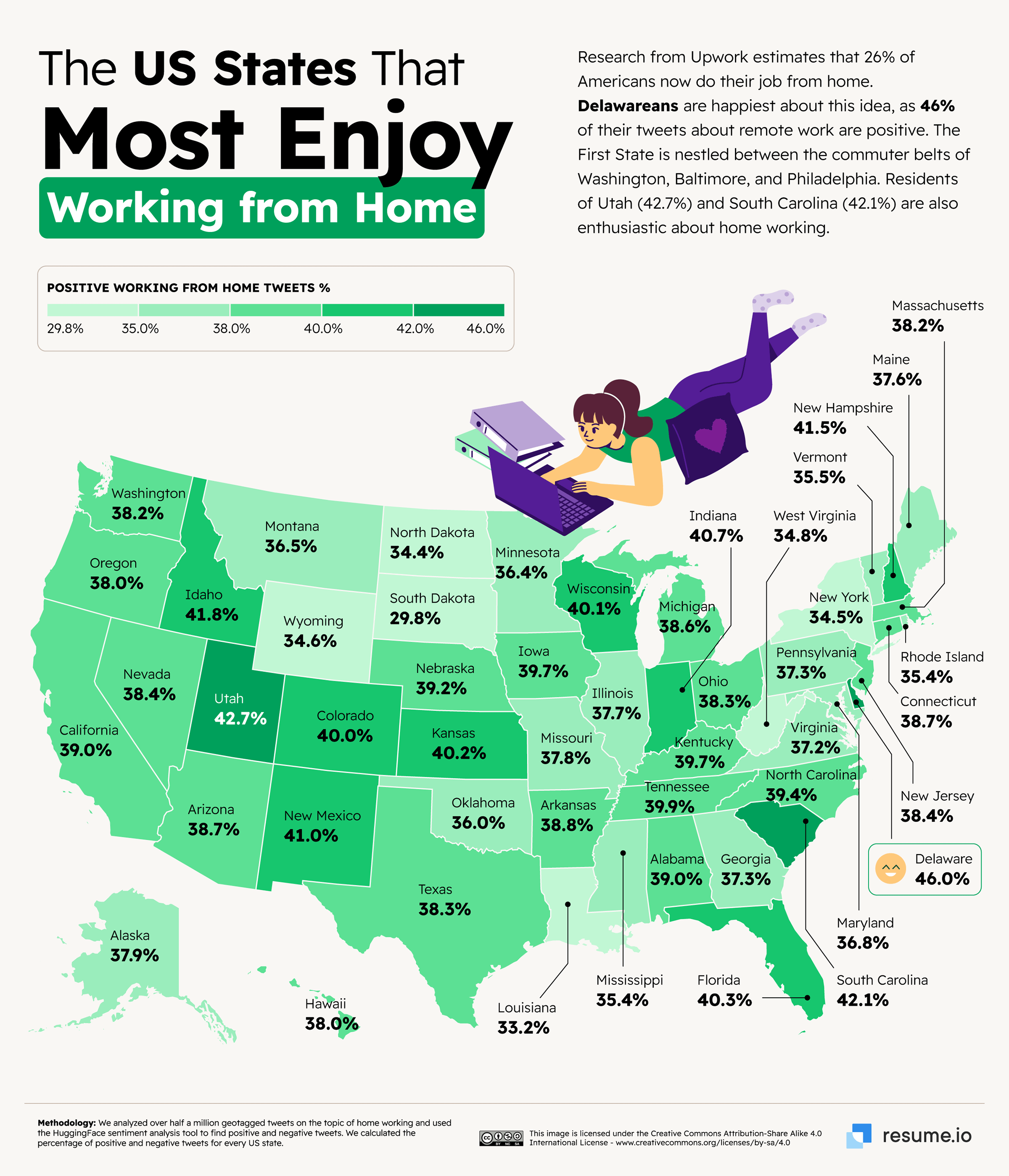
Nestled between the major population centers of Washington, Baltimore, Philadelphia and New York City, more than 10,000 people in the state commute for 90 minutes or more each day. With precious hours of the day potentially saved, it’s no surprise that Delawareans are keenest on remote work.
Meanwhile, residents of the Dakotas are less convinced. Both North (29.8%) and South (34.4%) display weaker levels of support for home working.
El Paso Locals Spared of Cross-Border Commute Support Home Working the Most
Located on the Rio Grande river, residents of El Paso, TX, have one of the toughest commutes found anywhere in the US. It shares a border with the Mexican city of Ciudad Juarez, and thousands of residents move between the two countries every day for work and education.
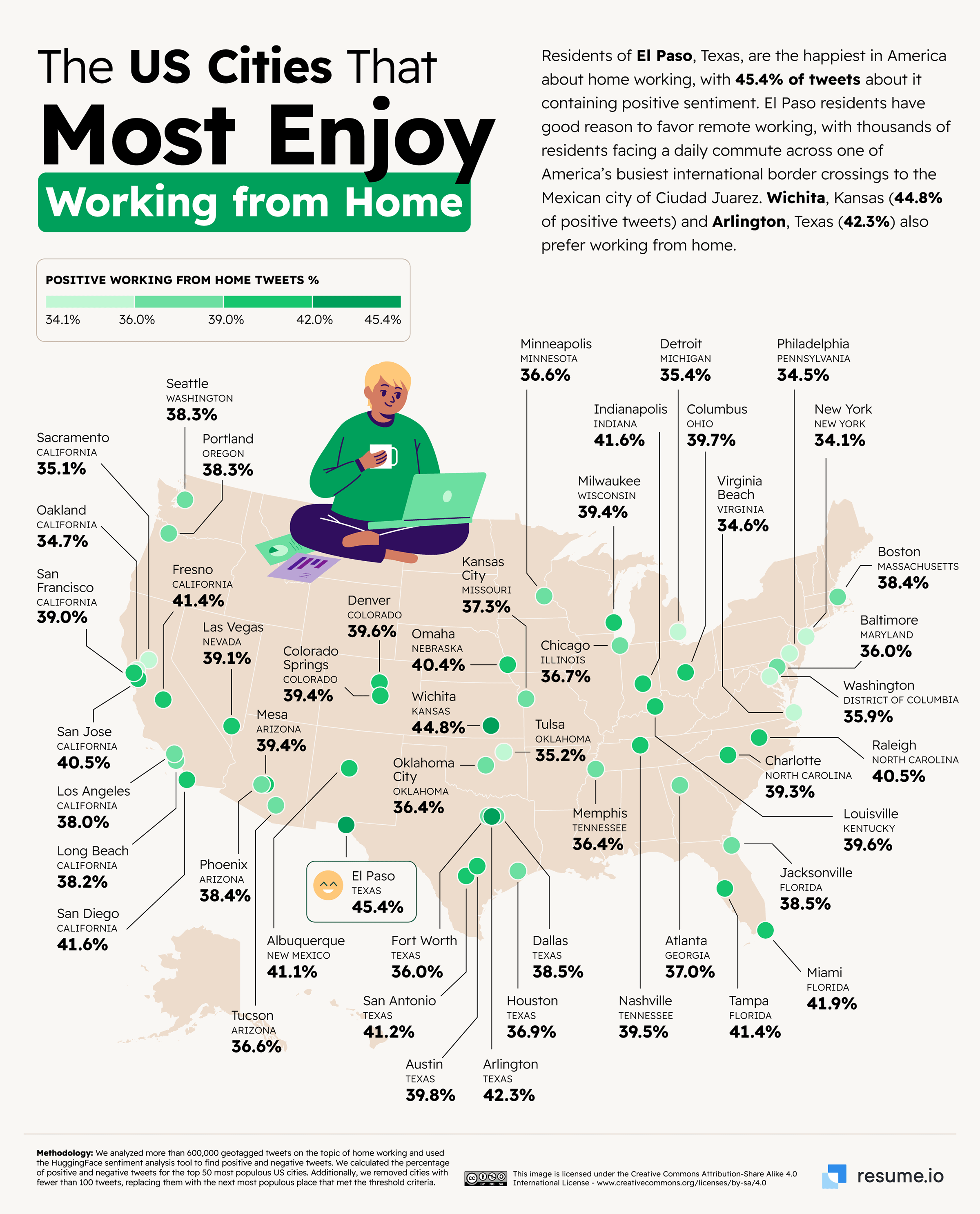
In 2017, 41 million people made the crossing, and heightened security checks on vehicles arriving from Mexico into Texas have brought the city’s traffic to a standstill. Residents describe the crossing as ‘inhumane.’
It’s no surprise then that 45.4% of tweets support home working. El Paso narrowly beats out Wichita, KS (45.4%) and Arlington, TX (42.3%) as America’s most supportive city when it comes to remote working.
Almost 60% of Brent Tweeters Love Remote Working
The remote working revolution has gripped London in the wake of the global pandemic. A study by King’s College London found that 84% of people in the capital who work from home at least once a week say that it has positively impacted their quality of life.
Residents of Brent are clearly supportive of this. Located in North London, our research found that 58.3% of Twitter posts about remote working in the borough contain positive sentiment - marginally more than nearby Haringey (56%).
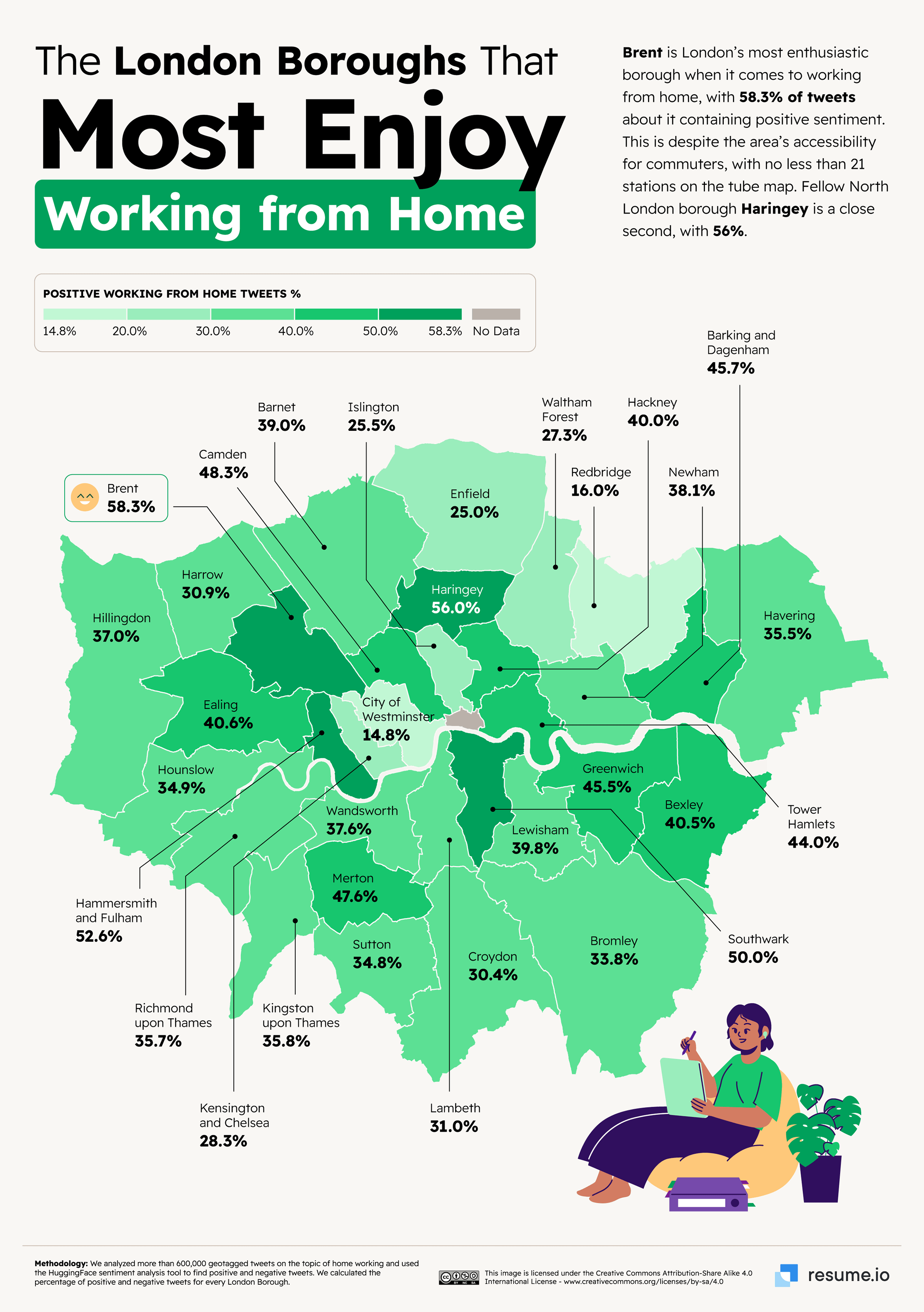
London is at the heart of the remote working debate. While workers overwhelmingly support the policy, there are concerns it will make up to a fifth of office space in the capital redundant, with potentially damaging knock-on effects on the city’s economy - particularly in retail and hospitality.
Watford Residents Love Remote Work More than Any Other UK City
In Spring 202, an ONS survey revealed that 38% of UK working adults are still working from home at least once a week - up from 12% prior to the pandemic. Of the 50 largest cities in Britain, we found that residents of Watford in Hertfordshire love remote work the most - 54.9% of tweets about it in the area have positive sentiment.
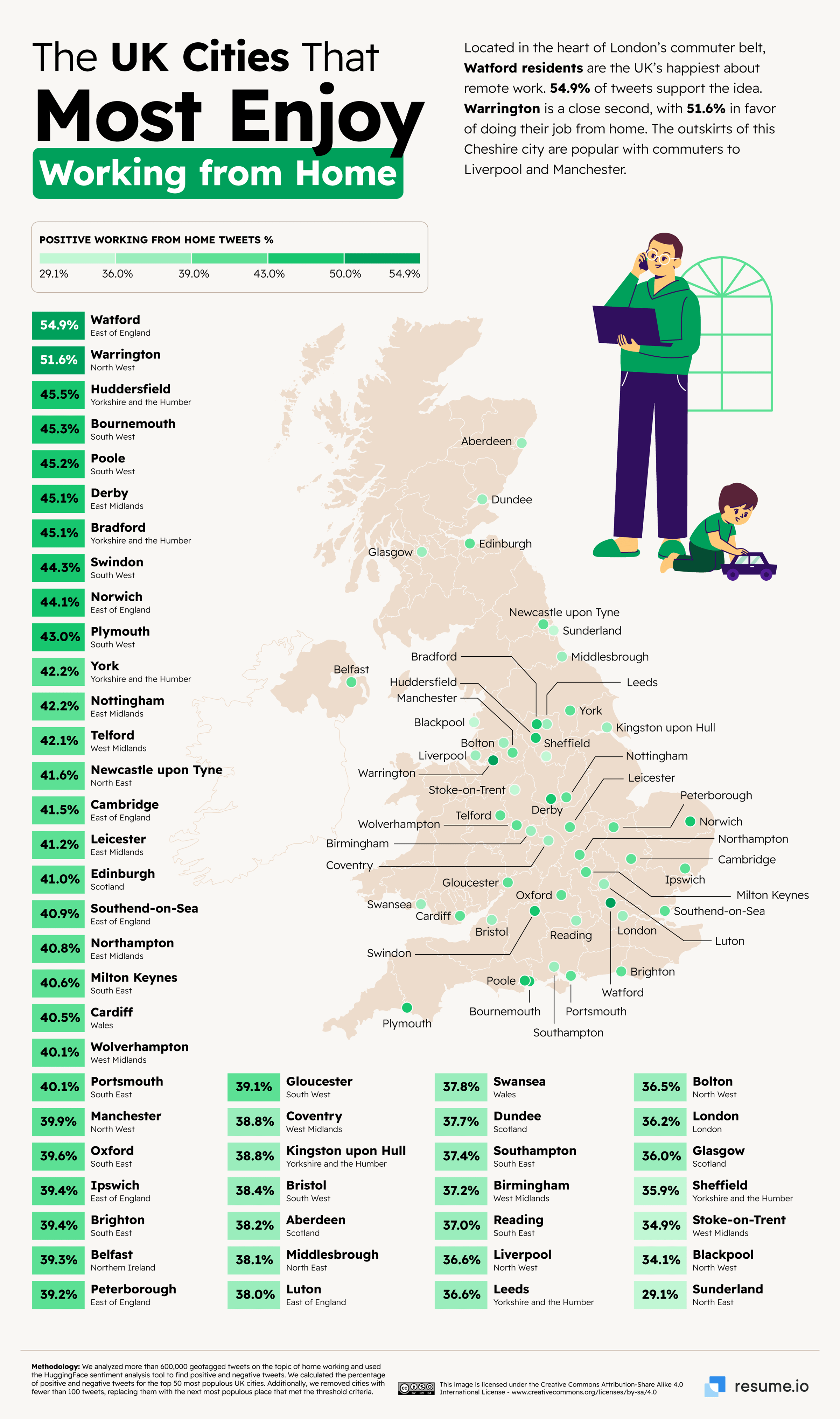
The city is in prime commuter belt territory. Located 15 miles from central London, Watford has the M25 orbital road on its doorstep and is the 3rd busiest train station in the East of England region.
Next on the list was Warrington in Cheshire, where 51.6% of tweets support remote working. The city is equidistant between the commercial centers of Liverpool and Manchester. Huddersfield (45.5%) was third on the list and is similarly placed between larger cities - Manchester and Leeds.
Which US Cities Love and Hate Remote Working?
A Pew Research Center survey found that 60% of Americans who can work remotely in their job said they would prefer to continue doing so once the Coronavirus pandemic was over. However, 60% of the workforce have jobs that cannot be done from home, and not everyone supports the shift.
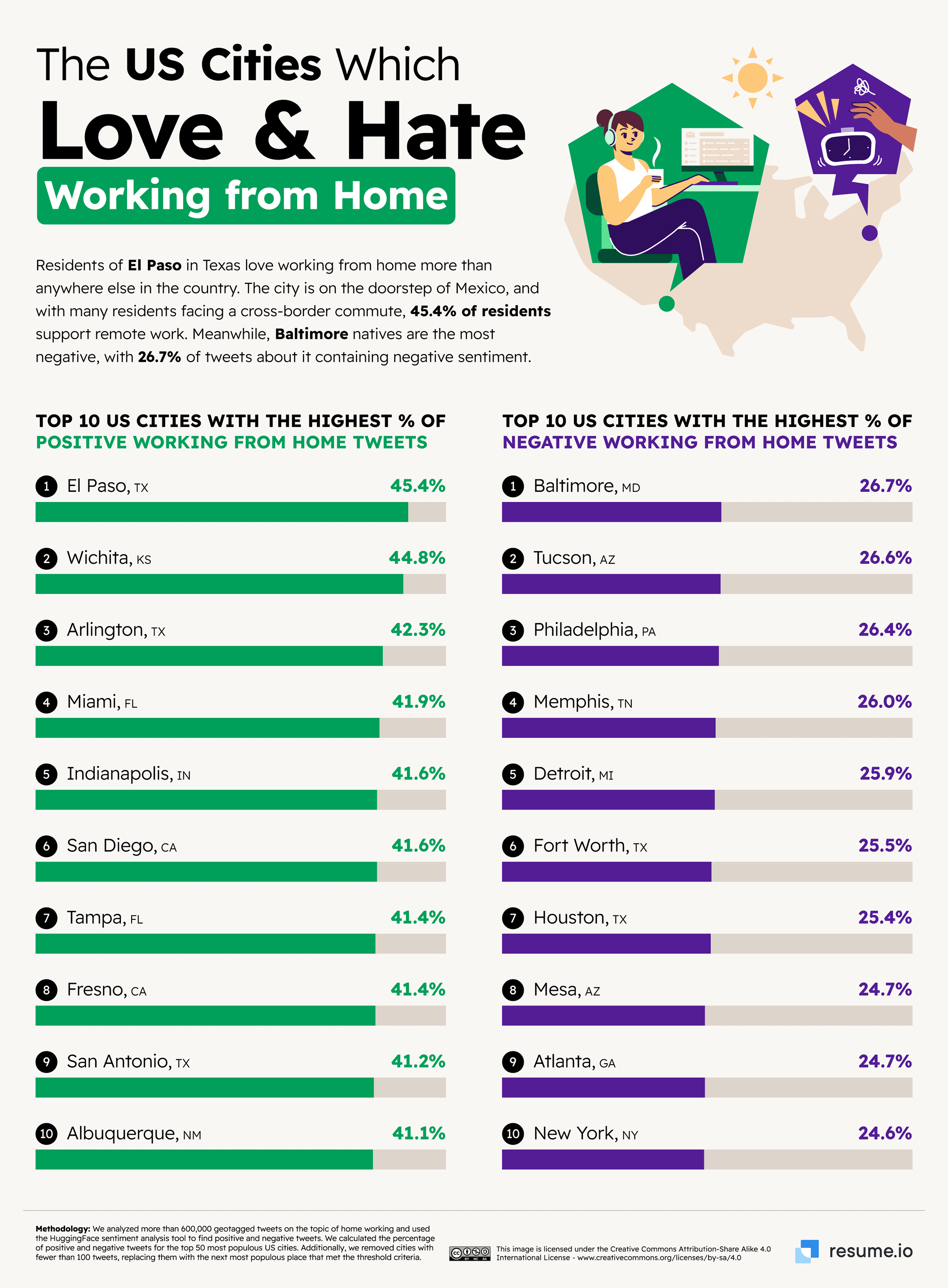
By contrast to the 45.4% of posts in support of home working in El Paso, TX, Baltimore locals are more critical. 26.7% of tweets in Maryland’s largest city contain negativity. Philadelphians feel the same way, with critical sentiment at 26.4%.
Which UK Cities Love and Hate Remote Working?
The future of remote work continues to divide people in Britain. Fewer than 1 in 10 workers say they want to return to the office five days a week, despite encouragement from government ministers for people to be back at their desks.
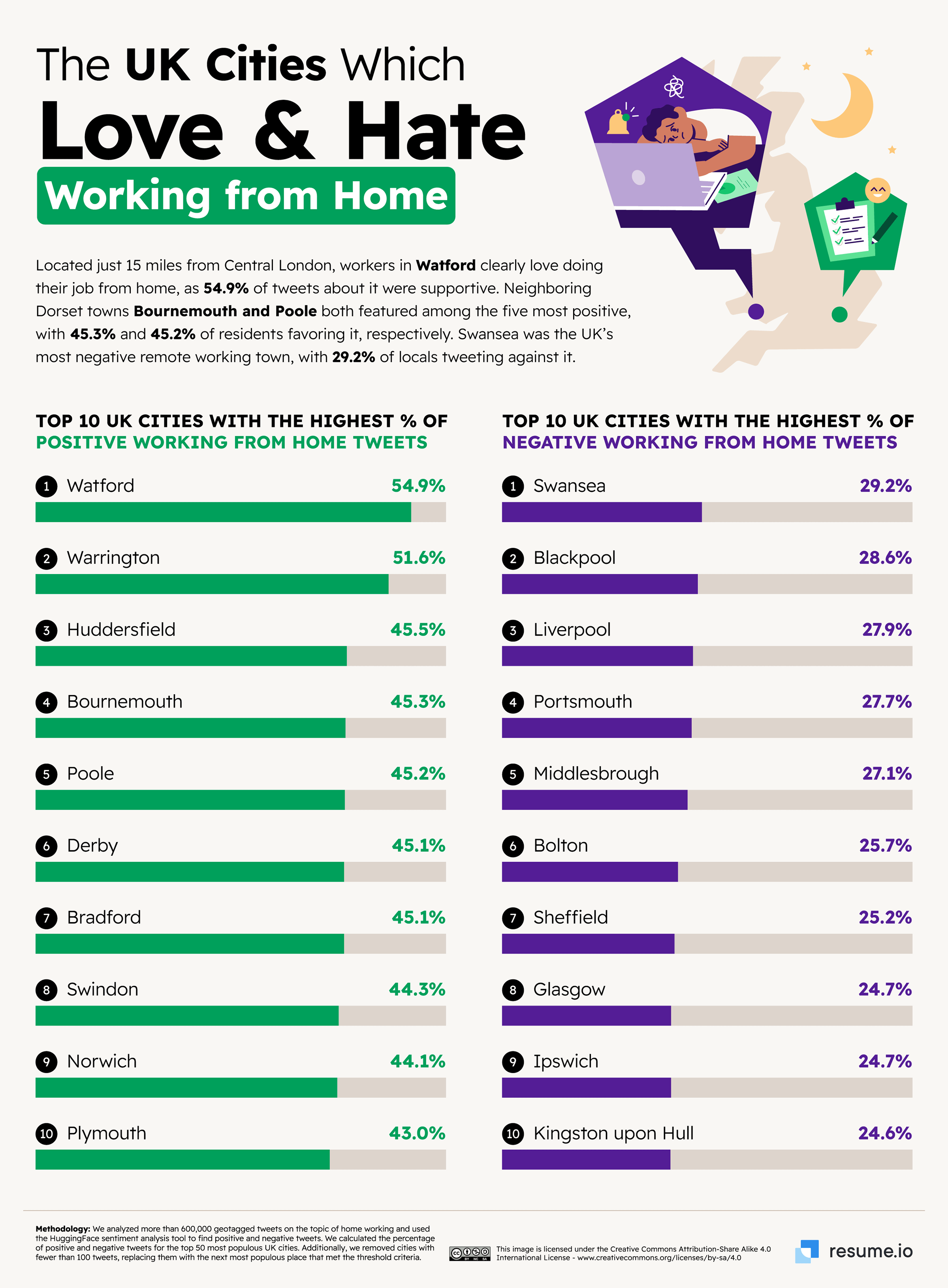
While 54.9% of commuter belt employees in Watford support home working, locals in Swansea are far less convinced. 29.2% of tweets in the south Wales town contain negative sentiment - more than anywhere else in the UK. Swansea’s workforce contains above-average levels of education, health, and retail staff, according to figures from the Welsh government.
Working From Home - Love It or Loathe It?
Whether you love or hate working from home, there is no doubt it is here to stay. The days of 9 to 5, five days a week on a consistent basis are over for many, especially if you work in an office. The culture has changed the dynamic in workforces from multinational corporations to tiny start-ups.
The advantages are plenty and obvious. No stressful commutes. More time at home with family. The ability to work at your own pace without constant oversight from bosses hovering around your desk. However, many companies have found it challenging to build a strong team culture. 60% of respondents in the Pew Research Center survey said working from home made them feel less connected to their co-workers.
Whether you support a full-time return to the office, hybrid work or fully-remote teams, check through our full data set below to see how your city or local area feels about working from home.
Click here to see the image in full size
Methodology & Sources
We curated a list of keywords around the topic of home working and used a scraping tool to find 1,270,459 tweets containing those terms. We then removed any duplicate/spam tweets and those posted by users whose locations we couldn't identify from their profiles, leaving us with 610,661 located tweets.
We used the HuggingFace sentiment analysis tool to find positive and negative tweets. We then labeled the tweets as "negative" if the probability of "negative" is higher than 0.5 and "positive" if the probability of "positive" is higher than 0.5.
Finally, we calculated the percentage of positive and negative tweets for every US state, top US and UK cities, and London boroughs. At the city-level for both US and UK, we started with the top 50 most populous cities of a country but removed those with fewer than 100 tweets, replacing them with the next most populous cities that met the threshold criteria.
The data was collected in May 2022.
- Saad, L., Wigert, B. (2021) ‘Remote Working Persisting and Trending Permanent’ gallup.com
- PwC. (2021) ‘It’s time to reimagine where and how work will get done’ pwc.com
- Ozimek, A. (2021) ‘Future Workforce Report 2021: How Remote Work is Changing Businesses Forever’ upwork.com
- Baker, K. (2016) ‘90 minutes to work? Mega-commuting takes hold in Del.’ delawareonline.com
- Pskowski, M. (2022) ‘Border agencies, truckers, leaders blast 'unnecessary' increased inspections stymying commerce’ elpasotimes.com
- Hinojosa, H. (2022) ‘Why the wait time to cross to Juarez is inhumane’ theprospectordaily.com
- King’s College London. (2022) ‘The WFH revolution: how new ways of working are changing London’ kcl.ac.uk
- Partridge, J. (2022) ‘Home working could make up to a fifth of London office space redundant’ theguardian.com
- Nelson, E. (2020) ‘London Offices Aren’t Refilling Fast Enough for Shops Relying on Them’ nytimes.com
- Office for National Statistics (2022) ‘Is hybrid working here to stay?’ ons.gov.uk
- Office of Rail and Road (2022) ‘Estimates of station usage’ orr.gov.uk
- Parker, K., Menasce Horowitz, J., Minkin, R. (2022) ‘COVID-19 Pandemic Continues To Reshape Work in America’ pewresearchcenter.org
- Neate, R. (2022) ‘Out of office? How working from home has divided Britain’ theguardian.com
- Welsh Government (2021) ‘Workplace employment by Welsh local areas and broad industry’ statswales.gov.wales





